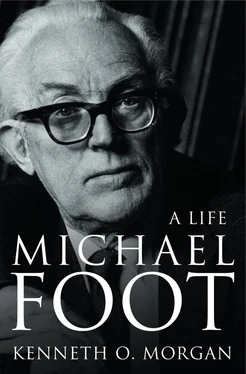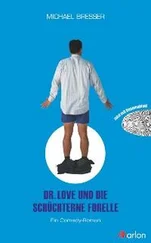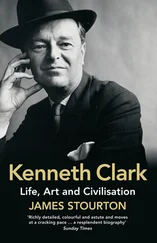These Labour MPs were soft left, but no more than that. With the possible exception of Geoffrey Bing, a barrister later to be Kwame Nkrumah’s Attorney-General in Ghana, they all felt themselves to be located within the capacious reaches of the party’s broad church – only just, in some cases. They were quite distinct from a much smaller, more extreme group – D. N. Pritt, John Platts-Mills, Konni Zilliacus, Leslie Solley and Lester Hutchinson (all later to be expelled from the party), along with William Warbey, Tom Braddock and Ronald Chamberlain. The French political commentator Bertrand de Jouvenel distinguished in 1949 between what he curiously called ‘the pacifist head’ of Cross-man and ‘the Russophil head’ of Zilliacus. 5 These hard-left dissentients, consistently pro-Soviet and anti-American, were scarcely within the Labour tabernacle at all. They tended to keep their own counsel. Their role in the party was minute, though they could sometimes ally with Foot’s friends, as in the famous ‘stab in the back’ motion on foreign affairs in November 1946 (see page 121). They might be joined also by virtual pacifists like Rhys Davies or Reg Sorensen. But Foot’s friends were more in the mainstream. Foot himself, like Crossman, had always been anti-Stalinist. He never took the sentimental view that ‘left could speak to left’. From 1948 his attitude towards the Soviet Union hardened, as did that of Bevan. Foot and Crossman were foremost among those inspired by the anti-Communist thrust of Arthur Koestler’s Darkness at Noon , not to mention those famous tracts against totalitarianism, especially Nineteen Eighty-Four and Animal Farm , written by the eminent recent Tribune columnist George Orwell. However blurred the boundaries might be on the more sectarian left of the parliamentary Labour Party, a fundamental divide between the future Bevanites and Tribunites, and the fellow-travelling fringe, was always apparent. With the two Communist MPs, William Gallacher and Philip Piratin, Foot had almost nothing to do, although he retained his admiration for Harry Pollitt, whom he considered a more considerable politician. He always felt that Pollitt’s return to Parliament for Rhondda West in 1945 (the Labour candidate, Mainwaring, beat him by just 972 votes) would have been politically valuable.
Foot’s contacts and manoeuvres in the new House were always with other backbenchers. His links with government ministers were mostly tenuous. He had scant enthusiasm for either Attlee or the Lord President Herbert Morrison, and clearly underestimated them both. The former he regarded as colourless and uninspired, and a wartime advocate of coalitionism; Morrison he saw as just a machine man, who wanted to curb backbenchers’ independence – unfairly so, since Morrison had shown much interest in ideas and policy-making before the war. For Ernest Bevin, the new Foreign Secretary, Foot began with a higher regard. Relations were sufficiently good for Bevin to ask him to go on a fact-finding mission to Persia (Iran) in February 1946. The purpose was to assess Russian infiltration in that country, from which Russian and British troops were due to withdraw on 2 March (in fact the British had already left). There was also anxiety that the Russians were taking root in Persian Azerbaijan, through the Tudeh party. Foot’s colleague was a Conservative ex-brigadier, Anthony Head, which led to predictable jokes about ‘Head and Foot’, and they had extensive talks with Tudeh leaders. Foot was convinced after this visit that there was abundant evidence for Soviet Russia’s intended domination of Iran. He also wrote in the Daily Herald in somewhat prophetic terms about the dangers to Anglo-American oil, including the refinery at Abadan, and made many sensible suggestions about changing the relationship between the British heirs of imperialism and the Persian authorities. But Bevin took little interest, and nothing tangible resulted from what was Foot’s one and only official activity on behalf of a British government until 1974. 6 But by the end of 1946, Bevin’s robust confrontational stance with the Soviet Union, and even more his blatantly anti-Jewish policy in Palestine, had earned him Foot’s anathema.
Nor was Foot in any sense a protégé of Hugh Dalton, the Chancellor of the Exchequer and patron of youth, as were centre-right figures like Gaitskell and Callaghan, along with Anthony Crosland and Denis Healey (neither yet an MP), to whom was added for a time Barbara Castle. In one rare exchange, Dalton wrote to rebuke Foot over factual inaccuracies in Tribune over the convertibility of sterling, with particular reference to the precise roles as advisers of Otto Niemeyer, Lord Catto and Wilfred Eady. Foot replied courteously, although he pressed the need for the Treasury to employ ‘more socialist economists’ to assist in ‘carrying out a Socialist policy’. 7 The only one of the government’s big five with whom he had ever been close was, of course, Sir Stafford Cripps, now President of the Board of Trade and eventually Chancellor of the Exchequer, but he had shed his links with Tribune and they seldom saw each other now. Cripps replied to a query from Foot about the Organization for European Economic Cooperation in 1948 in purely formal terms. 8
Foot was close to no other minister, with the obvious and seminal exception of Aneurin Bevan. With Foot working closely with Jennie Lee on the editorial board of Tribune , he served as a permanent socialist sounding-board for Labour’s Minister of Health as he pushed through the National Health Service. Their relationship became closer still after 1949, as Bevan found himself increasingly at odds with the drift of foreign and defence policy. Indeed, Foot, while increasingly critical of Attlee’s government, found his special relationship with Bevan made this one aspect of his parliamentary role rewarding, as he pressed Bevan to challenge government policy. Jennie Lee by contrast found the entire experience between 1945 and 1951 frustrating and depressing. 9
Foot later felt his speeches in the 1945–51 Parliament fell short of the highest standard. They were too complicated in structure, and perhaps too rhetorical. Sometimes the Oxford Union debates did not seem far away. He sounded more like a journalist in Parliament than a parliamentarian; his father was later to express concern on this point. But he began splendidly. His maiden speech, focusing on foreign policy, on 20 August 1945, was a clear success. 10 He complimented the King’s Speech in characteristic terms: ‘Oliver Cromwell could have hardly done a better job himself in the realm of foreign affairs.’ He proceeded with Guilty Men-type attacks on Churchill and other leading Conservatives for their pre-war sympathies with Mussolini and Franco, along with right-wing monarchs like King George of the Hellenes. He declared that Britain enjoyed both a conception of political liberty denied to the Russians and a conception of economic liberty not shared by the Americans. This ‘unique combination of treasures’ gave it ‘the commanding position of leadership if we choose to exercise it’. He wound up with a passionate affirmation of the socialist patriotism common at the time:
At the end of this great war and after this great election, the British people can play as conspicuous a part before the gaze of all mankind as they played in 1940. Hitler has left behind his terrible legacies – racial hatred, love of violence, hunger, homelessness, famine and death. Surely it is the duty of our great country not to be content with some secondary role, but rather to seek the abatement of those evils by the assertion and example of a much more positive democracy. As we look out across this stricken Continent and as we see a new hope in the struggle to be born across this wilderness of shattered faiths, may it not be our destiny as the freest and most democratic and a socialist power to stand between the living and the dead and stay the flames?
Читать дальше












